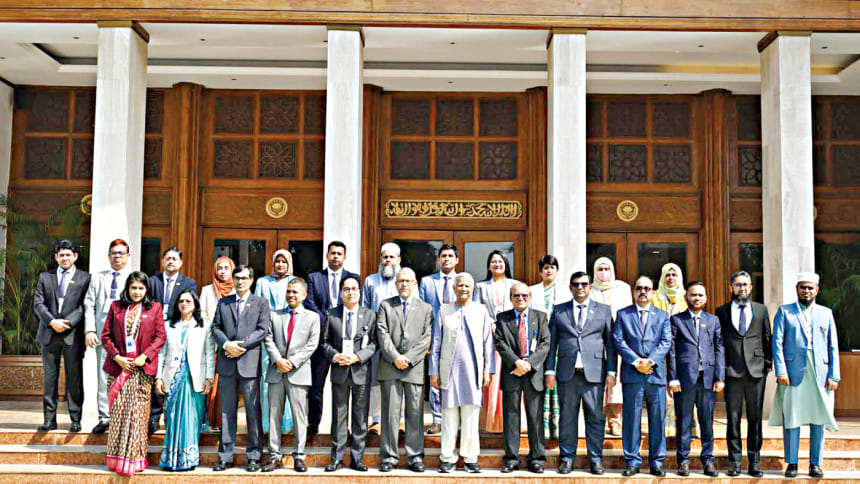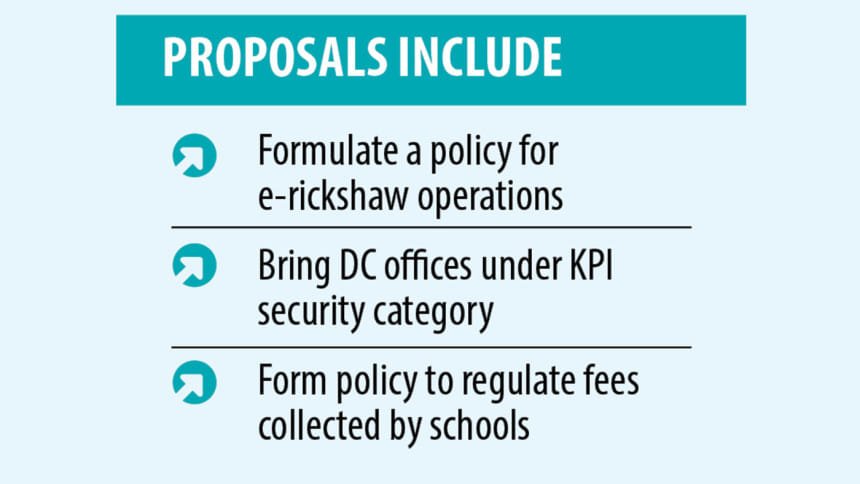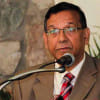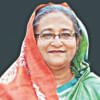DC conference-2025: DCs push to override local reps’ powers

Deputy commissioners yesterday proposed clipping the authority of local representatives while expanding their own administrative powers in various sectors.
Under the existing system, however, DCs and upazila nirbahi officers already have more power and privileges than elected local representatives, including zila parishad and upazila parishad chairpersons.
They made the proposal at the three-day "DC Conference-2025," which began in Dhaka yesterday.
Around 345 proposals from DCs of all 64 districts and divisional commissioners of eight divisions will be discussed at the conference, which is set to conclude tomorrow.
Shariatpur's DC proposed appointing the UNO as the chairperson of the upazila-level family planning department's recruitment committee, a post currently held by the upazila parishad chairman.
Rangamati and Pirojpur DCs, on the other hand, suggested handing over the chairmanship of the upazila disaster management committee to UNOs -- another post presently held by upazila parishad chairmen.
Additionally, the Faridpur DC proposed placing the recruitment and transfer of upazila parishad employees under the authority of DCs.

Currently, the UNO serves as the head of the recruitment committee for these employees, while the upazila chairman issues the appointment letters.
Additionally, DCs have proposed various benefits for government employees at both the district and upazila levels.
The DCs of Rajshahi and Jashore suggested creating a position for cooks at the UNO's residence. Notably, upazila chairmen do not have any such privilege.
The Mymensingh DC proposed constructing multi-storey buildings for government employees at the district and upazila levels, increasing housing loans for employees, raising the medical allowance for government staffers to Tk 5,000, and increasing the "educational assistance allowance" for their children from Tk 500 to Tk 2,000.
Meanwhile, the Gopalganj DC proposed introducing mobile phone and internet allowances for field administration employees.
Madaripur's DC suggested including circuit houses and DC offices under the Key Point Installation security category, particularly as DC offices in several districts were attacked during the July uprising.
Additionally, the DCs of Bandarban, Khagrachhari, and Rangamati proposed increasing the hill tracts allowance for government employees working in the three hilly districts.
A hill tracts allowance is an extra payment given to government employees who work in remote areas.
Meanwhile, Bandarban's DC proposed placing the transfer and posting of additional deputy commissioners under the authority of divisional commissioners. Currently, this responsibility falls under the public administration ministry.
Pabna DC Mohammad Mofizul Islam proposed formulating a policy to regulate the fees charged for various purposes by government and private educational institutions within an academic year, as well as setting guidelines on how these collected fees should be spent.
In his proposal, he argued that this would "ensure financial transparency in educational institutions" by preventing arbitrary fee collection and ensuring a standardised fee structure.
Additionally, the policy would mandate specific guidelines for expenditure, ultimately benefiting students and parents.
The DC of Magura proposed introducing a transfer system for teachers of private secondary schools, saying it would enhance professionalism and efficiency among teachers.
Additionally, the DCs of Satkhira, Mymensingh, Manikganj, Pabna, and Rangamati have put forward multiple proposals regarding the development of madrasa-based education.
DCs of Gopalganj and Joypurhat, along with Sylhet's divisional commissioner, have proposed introducing a ration system for all levels of field administration employees.
They said that, like various law enforcement agencies, administrative staffers also work tirelessly to implement government decisions during times of crisis.
They further pointed out that while civilian employees of the Anti-Corruption Commission and the Department of Narcotics Control receive ration benefits, field administration employees do not.
The Joypurhat DC also proposed allocating risk allowances for district administration employees, while Satkhira's DC suggested increasing allowances for additional responsibilities.
A "risk allowance" for administration employees would typically refer to financial compensation for those exposed to potential risks in their work.
Meanwhile, several DCs made various public welfare-related proposals, such as formulating a policy for e-rickshaws (easy bikes) operating nationwide, abolishing the railway's quota for dependents, establishing Implementation Monitoring and Evaluation Division and ACC offices in all districts with adequate manpower, and expanding the scope of operations under mobile courts.

 For all latest news, follow The Daily Star's Google News channel.
For all latest news, follow The Daily Star's Google News channel. 









Comments